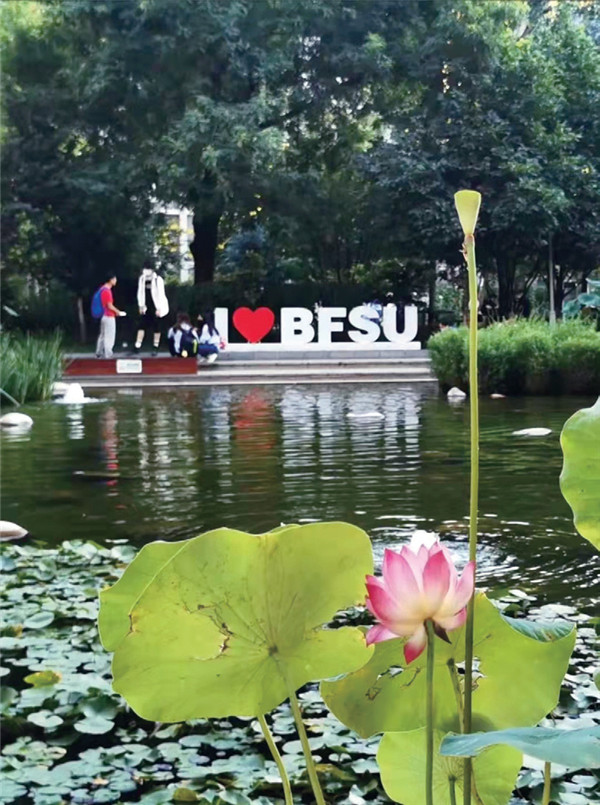邂逅中国,收获成长
[泰国] 傅启闰 北京外国语大学

说起中国,你首先会想到什么?是山河苍茫,还是历史悠长?是礼仪之邦,还是美食之乡?也许你的心中有属于自己的答案,但我的答案很简单——汉语。正是汉语让我与中国结缘,让我邂逅了这样一个美丽的国家,也让我成为更好的自己。
我与汉语其实在孩童时代就已经结下了深厚的情缘,透过汉语,我看见了一个美丽的中国、浪漫的中国。在父母的支持下,幼儿园时,我进入华文学校学习。在那里,我第一次见到来自中国的汉语老师,他们带着我一起唱儿歌、做游戏、讲故事,还教我说汉语。也是从那时起,我才知道原来这个世界上,有一个国家叫中国,他们说的语言叫汉语。在我进入小学时,学校里的汉语老师就开始教我们学习汉语拼音了。“b,p,m,f……”听上去就像动听的音乐,在我的心中久久回荡着。老师还教我们练习写汉字,我在“高”字里看到了雄伟的城楼,在“莫”字里看到了夕阳渐渐隐没在草地中的浪漫,在“采”字里看到了辛勤劳作的场景……那一个个方块字简直就像一幅幅美丽的图画,描绘着诗情画意的人生。但即使是面对这么美丽的汉字,刚开始学习写汉字的时候,真的觉得好难好辛苦,字音难读,字形难认,字义难辨……我曾经想退却,甚至想放弃。不过在热爱与鼓励之下,我迎难而上。慢慢地,我不仅掌握了汉字的写法,也发现了汉字的奇妙。比如“吃”字,混得好叫“吃得开”,受人欢迎叫“吃香”,不顾他人叫“吃独食”,负担太重叫“吃不消”……简单一个字,就可以用在这么多地方,可见中国的汉字文化有多么的博大精深。

北京外国语大学 / 傅启闰提供
虽然我已经掌握了很多的汉字和词语,但真正运用到生活当中,也闹过一些笑话,这让我明白了“慎言”的重要性。记得有一次,我在办公室里和我的中文老师聊天,聊着聊着,老师说她要出去买些东西,我就礼貌地对老师说:“老师您一路走好!”老师当时就扑哧一笑。在我不明所以的时候,老师笑着跟我解释说,这句话是对去世的人说的,并不能表示我想表达的意思。为了表示我的歉意,我想陪老师一起去买东西,所以我又开口对她说:“老师,我送您上路吧!”结果老师又笑得不能自已,我也很茫然,难道我又说了什么奇怪的话?老师很慈爱地拉着我的手,给我解释了“上路”的真实含义。现在回想起当时的场景,我还是会觉得尴尬和歉疚,可是我的老师并没有责怪我,反而让我记住了这些实际意思与字面意思不同的用法。这也提醒了我,真的是要谨言慎行啊!
因为学习汉语,我也逐渐成长起来,逐渐找到了自己的使命感。学汉语的时间越长,对“学好汉语,走遍天下”这句话的领悟就越深刻。学会了汉语,不仅对我有帮助,我还能帮助别人。去年,新冠肺炎疫情在全球暴发,泰缅边境很多华人来医院做检查,但医院里没有会讲汉语的医生,华人也不会讲英语,所以他们鸡同鸭讲,驴唇不对马嘴,双方又着急又无奈地僵持了很久。那时,我刚巧在那里做体检,看到了他们所遇到的困难,我就毅然当起了志愿者,陪在医生的身边做贴身翻译。在我的帮助下,他们终于能做检查了,医生们也不再愁眉苦脸了,我很为他们感到高兴。当他们一一对我道谢的时候,我的心情很奇妙,所学能有所用,帮助别人的感觉真的既开心又温暖。
这便是我与汉语的故事。汉语让我学习到了很多中国的知识,也让我成长为更好的自己。其实我从小就有一个梦想,就是真正到中国留学。我想去亲眼看看古装电视剧里的建筑是不是真的那么华丽,想去听听传统相声,感受地道的中国文化,更想去体验中国的“三美”——美食、美景、美人。可是,目前疫情尚未结束,我去不了中国,只能通过网课学习。虽然有些遗憾,不过我也不会气馁,我相信疫情终究会过去,美好一定会如期到来!我与中国的美丽邂逅,才刚刚开始!
Get Growth in China
[Thailand] Serichai Tatiya, Beijing Foreign Studies University
When it comes to China, what comes to your mind first? Is it the vast territory, the long history, the reputation as the state of ceremonies and decorum, or the renown as a home of delicious cuisine? You may have your own answer, but mine is very simple – Chinese language, because it is Chinese that makes me get to know this beautiful country and be a better self.
I got to know the Chinese language when I was a child. I was amazed to see a beautiful and poetical country through its language. With the encouragement of my parents, I had an experience to be in a Chinese-speaking kindergarten where I first met my Chinese teachers. They led us to sing songs and play games. They told us stories and taught us Chinese. Since then, I have known that there is a country called China and there is a language called Chinese. In primary school, our Chinese teachers began to teach us Chinesepinyin (a Romanized system of the Chinese pronunciation). “b, p, m, f…” it sounded like melodious music, echoing in my heart. We were also taught to write Chinese characters: I could see the magnificent gate towers from the character “高” (tall); I could appreciate the romantic scenery of the gradual sunset behind the grassland from the character “莫” (with original meaning of “sunset” in ancient Chinese); I could see the hardworking in the field from the character “采” (gathering)… Each character was like a beautiful picture, depicting the poetic life. Beautiful as the characters are, it was really difficult for me to learn them at the beginning. The characters were hard to pronounce, difficult to recognize, challenging to understand… In awe of this difficult language, I had even had the idea of giving it up, but at last, with my passions and my parents’ encouragement, I rose to the challenge. Gradually, I not only had a good grasp of the Chinese writing but also discovered the marvellousness of Chinese characters. The character “吃” (with original meaning of “eat”), for instance, can be used in many phrases but with the completely different meanings. For example, “吃得开” (being popular or being sought after), “吃香” (being in great demand or being valued), “吃独食” (taking the benefit by oneself without sharing with the others), “吃不消” (being unable to bear)… The way that a single character can be used in various ways illustrates the extensiveness and profoundness of the culture of Chinese characters.
Although I thought I had had a good grasp of many Chinese characters and phrases, in real contexts I still made some comical mistakes, from which I realized the importance of “cautiousness in speaking”. There was one time when I was chatting with my Chinese teacher in her office. She said she was going to buy something. I politely said to her “老师您一路走好” (which literally means “take care on your way, my teacher”). She chuckled and I was in great confusion. She then explained to me with a smile that this expression was normally used for the dead (with meaning of “rest in peace”), not what I had supposed it to be. To express my apology, I wanted to help her with her shopping. I said “老师,我送您上路吧” (with literal meaning of “Let me send you on your way, my teacher”). This time she could not help laughing out loud and once again I felt puzzled. Did I say anything ridiculous again? She put my hand in hers amiably and explained to me the true meaning of “上路” (with a literal meaning of “set out on the way” but actually it means “to go towards death”). Now I still feel embarrassed and apologetic when thinking back on that moment. However, my teacher was so kind not to blame me, which helped me to memorize how to use expressions with actual meanings different from their literal ones. This also reminds me that it is really important to be cautious when speaking a new language!
Because of learning Chinese, I have gradually grown up and found my sense of mission. The longer I learn Chinese, the deeper my understanding of the saying “A good learning of Chinese will facilitate your travel around the world.” Learning Chinese not only benefits myself but also makes me be able to help other. When the COVID-19 pandemic hit the world last year, many Chinese people on the Thailand-Myanmar border came to the hospitals for checkups. The doctors there were not Chinese-speaking and the Chinese people did not know how to speak English. The ineffective communications and misunderstanding led to anxiousness and helplessness. I happened to do my physical examination there at that time and I volunteered to be the interpreter. I was very happy to see that with my assistance, the Chinese patients were able to get checkups and the doctors were no longer worried. It was a wonderful feeling when they thanked me, as what I had learned was applicable. I felt happy and warm to help others.
This is my story with Chinese language, which helps me learn a lot of knowledge about China and lets me be a better self. In fact, it has been my dream to study in China since I was a child. I want to see by myself whether the architectures are as magnificent as those in the costume dramas. I want to listen to traditional crosstalk and feel the authentic Chinese culture. It is also my great hope to experience the “three excellences” of China: excellent food, excellent scenery and excellent people. However, I am not able to come to China as the pandemic is not over yet. I can only learn through online classes. Although there are imperfections, I will not be discouraged. I believe that the pandemic will eventually end and happiness will come as expected! My beautiful meeting with China, has just begun!



